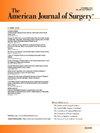Reassessing the association between HIV status and post-operative complications in the modern Era
IF 2.7
3区 医学
Q1 SURGERY
引用次数: 0
Abstract
Introduction
Advances in HIV care have dramatically reduced perioperative mortality, challenging outdated beliefs about worse outcomes for people with HIV (PWH). This study aims to compare odds of developing infections and wound complications in PWH versus non-PWH controls undergoing general surgery.
Methods
A data linkage between the British Columbia (BC) HIV-treatment database and hospital administrative data was used to identify PWH, and matched non-PWH who underwent general surgery in BC, Canada between 2008 and 2020. Post-operative infections and wound complications within 30 days were identified using ICD)-9/10 codes.
Results
Among 1252 PWH and 5008 matched non-PWH, HIV status was not significantly associated with post-operative infection (OR:0.95, 95 %CI:0.78–1.16) or wound complications (OR:1.07, 95 %CI:0.19–6.00). However, PWH on income assistance (OR:1.57, 95 %CI:1.26–1.95), with a substance use disorder (OR:1.38, 95 %CI:1.08–1.77) or IV drug use (OR:2.90, 95 %CI:2.28–3.69) had higher odds of post-operative infection.
Conclusion
HIV status alone does not increase the likelihood of post-operative infections or wound complications. However, socioeconomic factors such as being on income assistance and having substance use history likely impact these risks.

重新评估现代艾滋病病毒感染状况与术后并发症的关系
艾滋病毒护理的进步大大降低了围手术期死亡率,挑战了关于艾滋病毒感染者(PWH)预后较差的过时观念。本研究旨在比较PWH组与非PWH组在接受普通手术时发生感染和伤口并发症的几率。方法采用不列颠哥伦比亚省hiv治疗数据库与医院管理数据之间的数据链接来识别PWH,并匹配2008年至2020年在加拿大BC省接受普通手术的非PWH患者。使用ICD -9/10编码识别术后30天内的感染和伤口并发症。结果在1252例PWH患者和5008例匹配的非PWH患者中,HIV感染与术后感染(OR:0.95, 95% CI: 0.78-1.16)或伤口并发症(OR:1.07, 95% CI: 0.19-6.00)无显著相关性。然而,收入援助的PWH (OR:1.57, 95% CI: 1.26-1.95),物质使用障碍(OR:1.38, 95% CI: 1.08-1.77)或静脉吸毒(OR:2.90, 95% CI: 2.28-3.69)术后感染的几率更高。结论单纯感染hiv不会增加术后感染和伤口并发症的发生。然而,社会经济因素,如接受收入援助和有药物使用史,可能会影响这些风险。
本文章由计算机程序翻译,如有差异,请以英文原文为准。
求助全文
约1分钟内获得全文
求助全文
来源期刊
CiteScore
5.00
自引率
6.70%
发文量
570
审稿时长
56 days
期刊介绍:
The American Journal of Surgery® is a peer-reviewed journal designed for the general surgeon who performs abdominal, cancer, vascular, head and neck, breast, colorectal, and other forms of surgery. AJS is the official journal of 7 major surgical societies* and publishes their official papers as well as independently submitted clinical studies, editorials, reviews, brief reports, correspondence and book reviews.

 求助内容:
求助内容: 应助结果提醒方式:
应助结果提醒方式:


